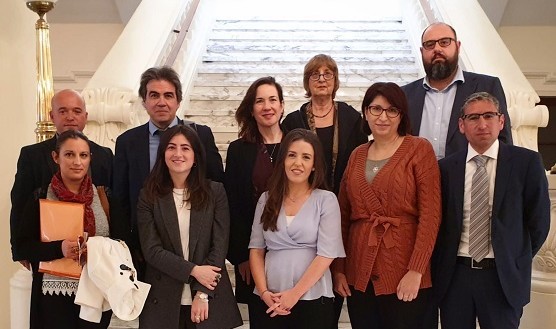Malta, 6 March 2020 – Access Info Europe representatives today met with civil society and journalists from Malta to discuss strategies for improving respect for the right of access to information. The discussion centred on how to ensure that the 2008 Freedom of Information Act is properly implemented, as well as how to secure eventual improvements to the law, and how to change the administrative culture to one more favourable to transparency and open government.
The problems identified include high levels of refusals which do not contain detailed justifications, administrative silence, the length of the appeals process, and examples of failure to comply with decisions by the Information and Data Protection Commissioner. Proactive publication of information is weak, particularly when it comes to the data needed to track government activity in areas such as healthcare, public procurement, and migration. There is also a lack of participation in decision making in Malta, with CSOs often finding it difficult to meet with relevant government officials to discuss ongoing decisions. Similarly, some journalists have problems accessing government officials and briefings.
All these challenges face Maltese civil society organisations and journalists. They are in addition to the problem that Access Info encountered when submitting a request, which is that one has to be a resident in Malta for five (5) years before even having the right to ask for information, something Access Info is now challenging in the courts.
“There is an urgent need to strengthen government transparency in Malta and to ensure that journalists and civil society are able to use this essential democratic tool to protect other human rights and to fight against corruption,” commented Helen Darbishire, Executive Director of Access Info Europe.
“This is a priority issue in a situation in which there are huge concerns about corruption in Malta, and where there are ongoing demands for justice for the killing in October 2017 of journalist Daphne Caruana Galizia, one of the most shocking attacks on freedom of expression in Europe in recent years,” concluded Darbishire.
The Access Info team visiting Malta also heard reports of a weak culture of participation, and, with just a handful of exceptions, citizens do not demand information nor do they use the FOI law to submit requests.
Concerns about lack of transparency in Malta have been raised by international bodies such as the Council of Europe’s GRECO anti-corruption mechanism. Malta is a member of the Open Government Partnership but is currently under review for having failed to develop an action plan in collaboration with civil society.
At the meeting held in Valletta today, it was agreed that a series of actions are needed to strengthen respect for freedom of information in Malta. Next steps will include conducting a systematic data collection to map the current situation of access to information in Malta, and development of a series of recommendations for reform of the law and practice.
Access Info will work with Maltese CSOs to train activists, journalists, and members of the public on how to request information and how to challenge refusals. It was also agreed to coordinate pro bono legal support for access to information appeals, and, where necessary, to undertake strategic litigation. The medium term advocacy strategy is to secure a functioning access to information law and to develop a culture of transparency in Malta.
For more information, please contact:
Helen Darbishire, Executive Director | Access Info Europe
helen@access-info.org +34 637 226 609
Paula Domínguez, Communications Officer | Access Info Europe
paula@access-info.org +34 913 656 558

